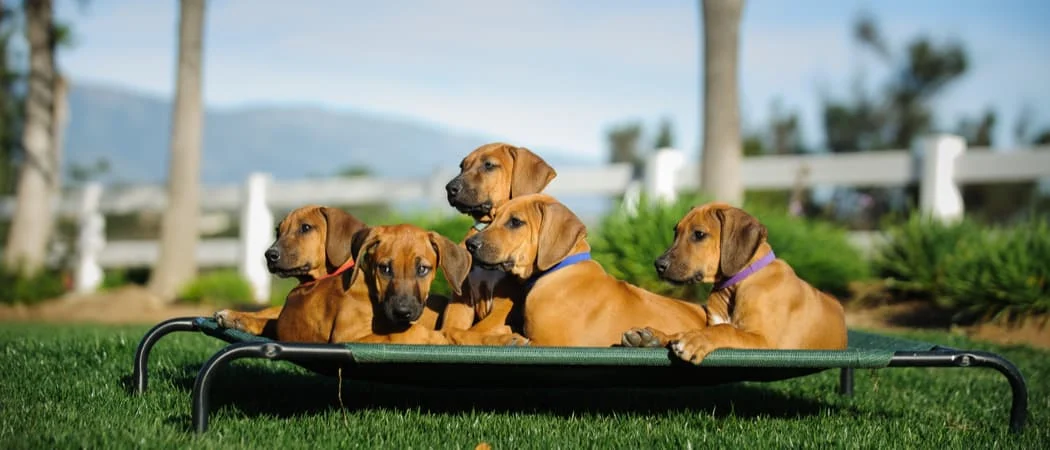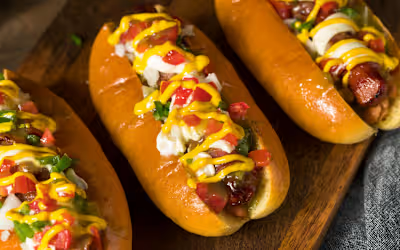Rhodesian Ridgeback Temperament: Do They Make Good Family Dogs?
The Rhodesian Ridgeback is a muscular and dignified dog that needs brisk daily walking and the chance to run as often as possible. These dogs are a combination of a sighthound and a scenthound. Additionally, they are not the kind of dogs you can leave alone at home for long periods and expect to sit quietly in anticipation of their owner coming home. Actually, young Rhodesian Ridgeback’s temperament is mischievous, and they can get up to no good.
These dogs are territorial and should be socialized with other animals and people from an early age so their guarding instinct does not take over. Rhodesian Ridgebacks can be dominant over other animals, especially ones of the same gender. Therefore, some are fine with the family cat, while others will chase anything that moves. A Rhodesian Ridgeback temperament combines independence and wanting to please its owner. They will need consistency and an assertive owner. If they get this, they can be an excellent companion.
Temperament

Rhodesian Ridgebacks are large, muscular dogs that have a ridge of stiff hair along their backs. Also, they have short hair that is easy to care for, and they thrive on vigorous exercise and outdoor athletic activities.
Rhodesian Ridgebacks are large, muscular dogs that have a ridge of stiff hair along their backs. Also, they have short hair that is easy to care for, and they thrive on vigorous exercise and outdoor athletic activities. When they mature, they settle down and become calm and quiet. However, they do need lots of exercise, and as youngsters, they can be rowdy and destructive when bored or not stimulated enough. In addition, they need to be well-socialized to avoid becoming aggressive and over-protective. They have a natural chasing instinct and are strong-willed with a mind of their own.
A Rhodesian Ridgeback’s temperament can also be affected by their training and upbringing. One way of avoiding negative traits is by choosing an adult dog from a shelter, as their behavior will already be evident, and you can prevent negative characteristics. However, if you decide to get one from a breeder, you should ensure you choose the right breeder. Unfortunately, you can’t tell when they are puppies, their temperament, or if they will have health issues. Lastly, you can make sure that your dog is adequately trained and socialized.
Things to Consider If You Get a Rhodesian Ridgeback
These dogs need a lot of exercise. They are muscular and athletic. To maintain their health, they require regular opportunities to get rid of their energy and be stimulated. If they are not, they will become bored and destructive, and they may express this by chewing or barking. Also, if you leave them alone too long, you might return to a destroyed house or yard. Rhodesian Ridgebacks have a strong protective instinct, and if not socialized properly, they can become nervous, aggressive, or shy.
Additionally, they are originally hunting dogs and will most likely be dominant and aggressive towards other animals if not appropriately trained. The Rhodesian Ridgeback temperament is strong, and they have a mind of their own. Therefore, they are trainable, but only in the right hands. They need consistency and a firm hand.
Rhodesian Ridgeback Care
These dogs need a dedicated owner who can offer them daily exercise and sufficient socialization and training. They are powerful and strong-willed, so they can be challenging to handle if not taught how to behave. Luckily, they have a short coat and only require very basic grooming.
Exercise
Rhodesian Ridgebacks require daily mental stimulation and physical activity to stay healthy and happy. Therefore, they need at least one hour of exercise daily, which can include walking, hiking, playing, running, or jogging. Additionally, they excel in various sports, such as obedience, lure coursing, and agility. Therefore, dog sports is a great way to exercise and challenge their minds simultaneously. When taking a Rhodesian Ridgeback out, keeping them on a leash in case they decide to take off after perceived prey is vital. In addition, they love to dig, so having a fence they cannot dig under is crucial.
Grooming
This dog’s coat sheds moderately. However, Rhodesian Ridgebacks do not require a lot of grooming. A weekly brush to distribute oils and remove loose hair will be enough. However, when the weather changes, they may shed more in the fall and spring and require a brush more than once a week. Additionally, they should be bathed at least once a month or more, depending on how dirty they get. Then, their ears should be checked regularly for dirt or debris. As with most dogs, their nails should be checked once a month to see if they need trimming. Lastly, it is advisable to brush your dog’s teeth every day.
Training
These dogs are intelligent. However, they are strong-willed and independent, which could complicate training. Therefore, the key is consistency, patience, and positive reinforcement. It would be ideal to start training as young as possible, as an adult Rhodesian Ridgeback with bad manners will be challenging to control. Obedience school is a great way to train and socialize your dog at the same time. Also, exposing them to different places, people, and animals can help. Rhodesian Ridgebacks’ temperaments can cause them to be cautious around strangers. However, regular and early socialization can boost their confidence and comfort.
Common Health Problems
The Rhodesian Ridgeback has a life expectancy of between 10 to 12 years. However, they are susceptible to certain health issues. That is not to say they will get all of them, but knowing what to look for is a good idea.
Dermoid Sinus: This is a congenital disability that some puppies are born with, with a tube-like opening in the skin. It is also sometimes known as a pilonidal sinus. It manifests as a skin separation, and the nervous system is not entirely formed during embryonic development. It occurs on the dog’s upper spine, neck, or back. This condition can be treated with surgery.
Joint Dysplasia: This issue can affect elbows and hips. It is when joints do not develop properly, eventually leading to arthritis. Also, it is an inherited condition. In Rhodesian Ridgebacks, it will manifest as sore and stiff hips and elbows. However, a few treatments, such as medication, herbal remedies, and surgery, will make your dog more comfortable.
Juvenile Myoclonic Epilepsy: This congenital condition causes seizures that can begin from six months old. These seizures usually affect the front half of the dog’s body and can occur daily. They can even happen multiple times per day. Luckily for the dog and owner, this condition can be treated with medication.
Food-Induced Atopic Dermatitis: With this issue, dogs can be allergic to certain foods, leading to allergies, skin lesions, and scratching. This issue can be controlled with medication or changing the food to something that does not include the ingredients that the dog is allergic to.
History
As one can deduce from the name, the Rhodesian Ridgeback originates in the country once known as Rhodesia, now called Zimbabwe, in Africa. These dogs came about by crossbreeding the hunting dogs of a South African Khoikhoi tribe with other breeds imported by Dutch colonists, such as Terriers and Greyhounds. The result was the Rhodesian Ridgeback, and they soon became adept at navigating the African terrain and developing resilience to local pests such as the tsetse fly.
A Rhodesian hunter named Cornelius van Rooyen introduced two Ridgebacks into his pride of lions in the late 19th century. He discovered these dogs could hold their own against lions, giving hunters time to prep and aim their rifles. Also, they could run alongside men on horses and ward off predators such as leopards and baboons. Then, when the prey was shot, they would collect the antelope and return it to the hunter. Then they were also loyal and protective of their humans and made wonderful companions for adults and children. This dog breed was recognized in 1955 by the American Kennel Club as its 110th breed.
The photo featured at the top of this post is © olgagorovenko/Shutterstock.com
What's the right dog for you?
Dogs are our best friends but which breed is your perfect match?
Share on:
About the Author
Chanel Coetzee is a writer at A-Z Animals, primarily focusing on big cats, dogs, and travel. Chanel has been writing and researching about animals for over 10 years. She has also worked closely with big cats like lions, cheetahs, leopards, and tigers at a rescue and rehabilitation center in South Africa since 2009. As a resident of Cape Town, South Africa, Chanel enjoys beach walks with her Stafford bull terrier and traveling off the beaten path.
Thank you for reading! Have some feedback for us? Contact the AZ Animals editorial team.
Like this project
Posted May 1, 2024
Enjoy this article about Rhodesian Ridgeback temperament, including whether they make good family dogs and more.
Likes
0
Views
39



